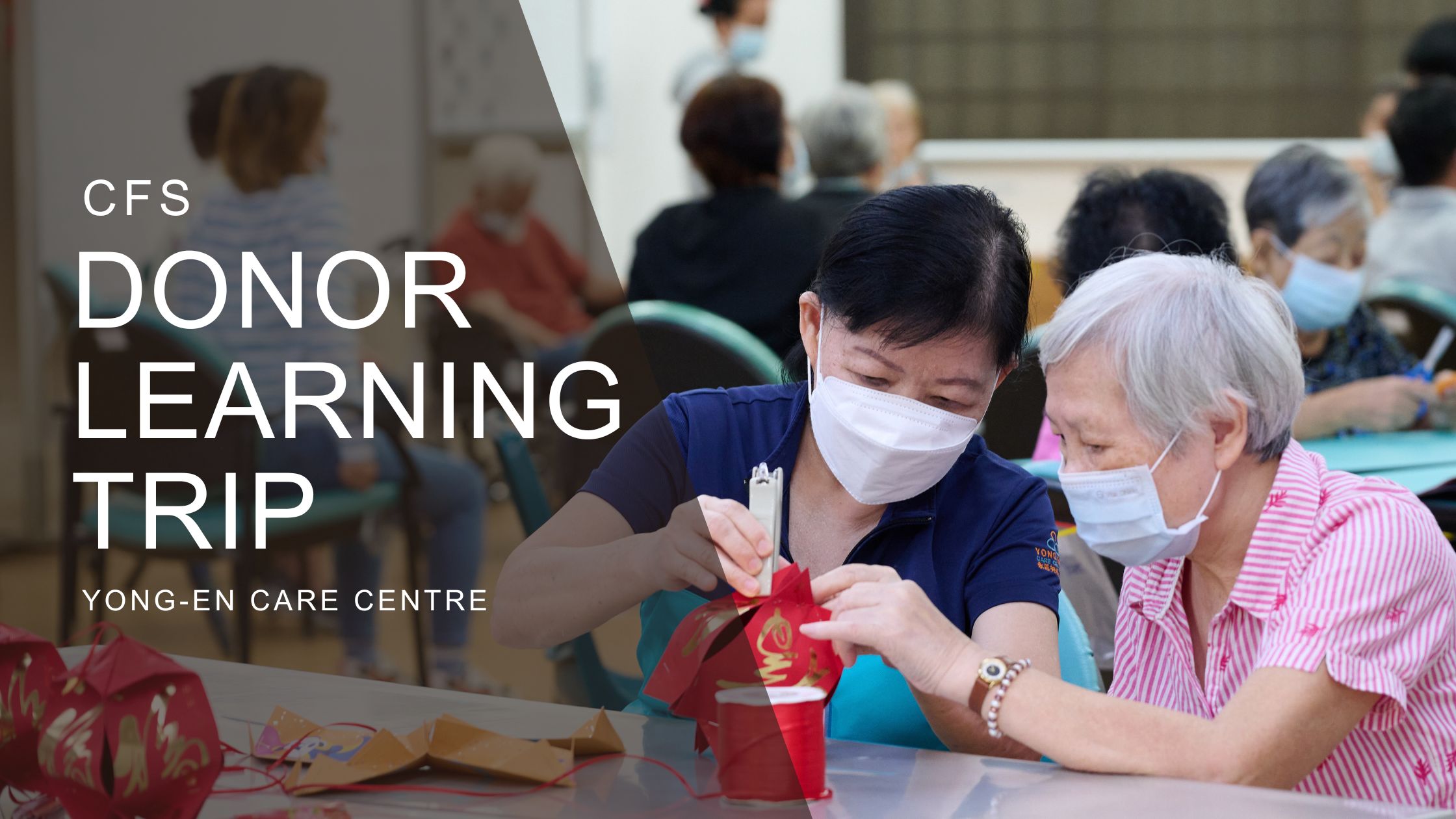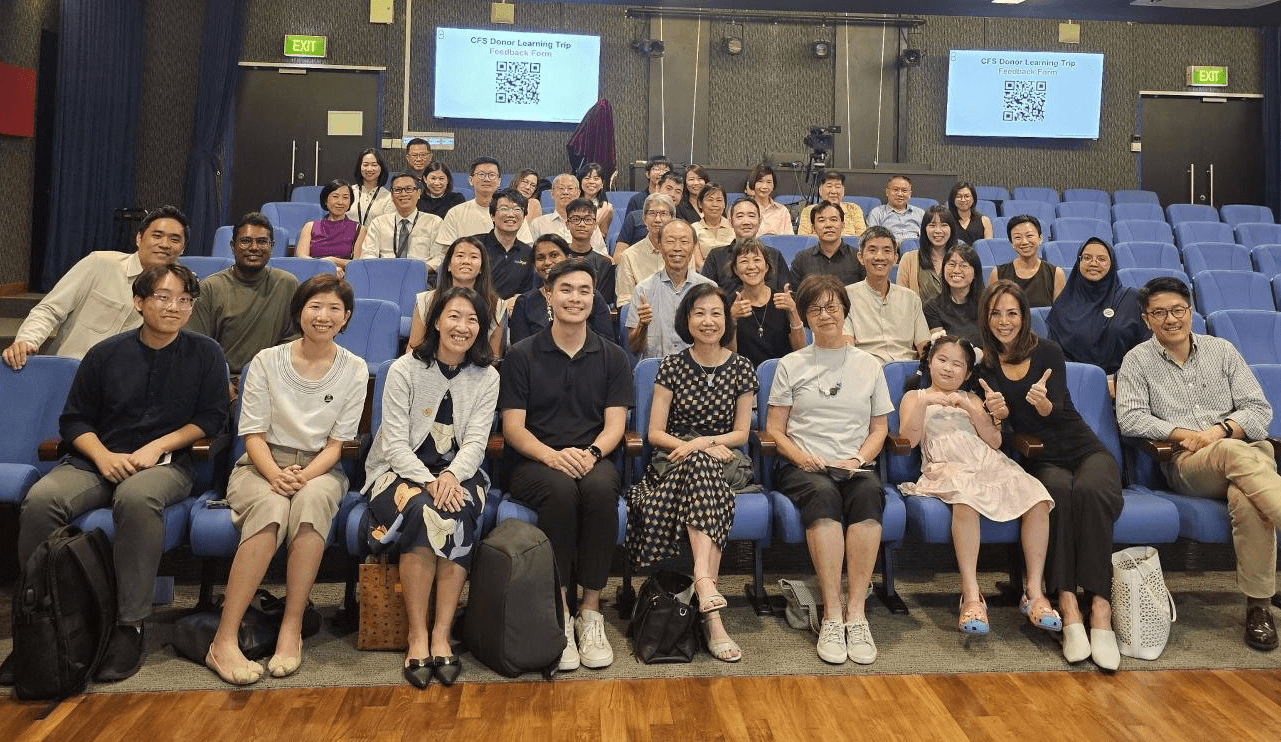CFS Donor Learning Trip Series: Empowering ageing well at Yong-en Care Centre


Several seniors were playing a game. Seated in pairs, they were passing a large ball around. The challenge? Don’t drop the ball! There was laughter and cheers as the ball wobbled from one pair to another. This is one of many therapeutic activities at Dementia Day Care, a keystone service by registered charity Yong-en Care Centre.
Yong-en Care Centre’s Dementia Day Care is a lifeline for 31 seniors – all with moderate to advanced dementia – and their overwhelmed caregivers. The programme is funded by the generous donors of CFS.
In May 2023, 11 donors from 7 donor-advised funds (DAFs) took the time to join our first Donor Learning Trip this year, to Yong-en Care Centre, to meet with the charity and discover how it cares for the vulnerable elderly. Ageing Well is one of CFS’s five focal areas for grantmaking, where we curate programmes that enable our senior generation to remain active and purposeful for a better quality of life in their golden years.
Yong-en Care Centre began 27 years ago serving the destitute elderly in Chinatown. It has since expanded its outreach to the Chin Swee, Outram and Bukit Merah areas. Its services have also gone beyond food security and befriending to a full suite of support for low-income families, single mothers, home nursing care, dementia, and active ageing. It is an under-the-radar charity that is quietly and steadily making an outsized impact.
During the visit, donors learnt how music therapy is being embedded into dementia care, as well as the support and workshops offered to caregivers, many of whom are also old. The Dementia Day Care runs daily activities that engage the beneficiaries’ cognitive functions and improve their motor skills, including the pass-the-ball game witnessed by our donors. Such multi-sensory activities are specially curated to help persons with dementia manage their condition.
Donors also received updates on Home Care, another programme that receives grants from CFS donors. Yong-en Care Centre is one of the 24 home care service providers in Singapore and its nurses visit homebound seniors to provide personalised medical care.
Yong-en Care Centre is rapidly expanding its dementia care services and introducing more active ageing programmes. It is also collaborating with other community care providers to set up an integrated services hub for seniors and their caregivers at Chinatown Point. To accomplish these initiatives, the non–profit relies on government grants and public donations. It does not use commercial fundraisers.
Through CFS, Yong-en Care Centre has managed to grow its donor base. “CFS connects us with donors who are truly aligned with our mission,” says Ms. Griselda Ong, director of Elderly Services at Yong-en Care Centre. In 2022, almost a third of funding (32.8%) for home care and 27.5% of funding for dementia day care came from CFS donors . “This support is significant as these critical services help the vulnerable age in place,” says Griselda.
“I have always been interested in supporting elder care,” says June Chia, a donor who set up a donor-advised fund (DAF) with CFS. “But there are many charities doing such work that I do not know of.” Through CFS, she learnt about Yong-en Care Centre.
June is inspired by Yong-en Care Centre’s impact on marginalised communities and its commitment to continuous progress. “I feel that my money is being well-utilised,” she shares. June appreciates CFS’s meticulous vetting of charities and our dedication to groundwork. Giving through a donor-advised fund (DAF) is also hassle-free, as CFS handles all the administrative work and provides regular updates on her fund.
I have always been interested in supporting elder care. But there are many charities doing such work that I do not know of. Through CFS, I learnt about Yong-en Care Centre and having seen first-hand what they are doing, I feel that my money is being well-utilised.
John Doe
For Yong-en Care Centre, meeting donors face-to-face was a valuable opportunity to deepen their understanding of its unique care model and to engage with them on any questions they may have, says Griselda. In addition, it is also an opportunity to thank CFS donors who have been supporting the charity and build a lasting relationship with them.
CFS assists charities and their underprivileged communities by connecting them with donors who are seeking to support causes and crucial needs that resonate with them deeply.
To find out more about the causes we support, please visit www.cf.org.sg/what-we-support/.
Several seniors were playing a game. Seated in pairs, they were passing a large ball around. The challenge? Don’t drop the ball! There was laughter and cheers as the ball wobbled from one pair to another. This is one of many therapeutic activities at Dementia Day Care, a keystone service by registered charity Yong-en Care Centre.
Yong-en Care Centre’s Dementia Day Care is a lifeline for 31 seniors – all with moderate to advanced dementia – and their overwhelmed caregivers. The programme is funded by the generous donors of CFS.
In May 2023, 11 donors from 7 donor-advised funds (DAFs) took the time to join our first Donor Learning Trip this year, to Yong-en Care Centre, to meet with the charity and discover how it cares for the vulnerable elderly. Ageing Well is one of CFS’s five focal areas for grantmaking, where we curate programmes that enable our senior generation to remain active and purposeful for a better quality of life in their golden years.
Yong-en Care Centre began 27 years ago serving the destitute elderly in Chinatown. It has since expanded its outreach to the Chin Swee, Outram and Bukit Merah areas. Its services have also gone beyond food security and befriending to a full suite of support for low-income families, single mothers, home nursing care, dementia, and active ageing. It is an under-the-radar charity that is quietly and steadily making an outsized impact.
During the visit, donors learnt how music therapy is being embedded into dementia care, as well as the support and workshops offered to caregivers, many of whom are also old. The Dementia Day Care runs daily activities that engage the beneficiaries’ cognitive functions and improve their motor skills, including the pass-the-ball game witnessed by our donors. Such multi-sensory activities are specially curated to help persons with dementia manage their condition.
Donors also received updates on Home Care, another programme that receives grants from CFS donors. Yong-en Care Centre is one of the 24 home care service providers in Singapore and its nurses visit homebound seniors to provide personalised medical care.
Yong-en Care Centre is rapidly expanding its dementia care services and introducing more active ageing programmes. It is also collaborating with other community care providers to set up an integrated services hub for seniors and their caregivers at Chinatown Point. To accomplish these initiatives, the non–profit relies on government grants and public donations. It does not use commercial fundraisers.
Through CFS, Yong-en Care Centre has managed to grow its donor base. “CFS connects us with donors who are truly aligned with our mission,” says Ms. Griselda Ong, director of Elderly Services at Yong-en Care Centre. In 2022, almost a third of funding (32.8%) for home care and 27.5% of funding for dementia day care came from CFS donors . “This support is significant as these critical services help the vulnerable age in place,” says Griselda.
“I have always been interested in supporting elder care,” says June Chia, a donor who set up a donor-advised fund (DAF) with CFS. “But there are many charities doing such work that I do not know of.” Through CFS, she learnt about Yong-en Care Centre.
June is inspired by Yong-en Care Centre’s impact on marginalised communities and its commitment to continuous progress. “I feel that my money is being well-utilised,” she shares. June appreciates CFS’s meticulous vetting of charities and our dedication to groundwork. Giving through a donor-advised fund (DAF) is also hassle-free, as CFS handles all the administrative work and provides regular updates on her fund.
I have always been interested in supporting elder care. But there are many charities doing such work that I do not know of. Through CFS, I learnt about Yong-en Care Centre and having seen first-hand what they are doing, I feel that my money is being well-utilised.
John Doe
For Yong-en Care Centre, meeting donors face-to-face was a valuable opportunity to deepen their understanding of its unique care model and to engage with them on any questions they may have, says Griselda. In addition, it is also an opportunity to thank CFS donors who have been supporting the charity and build a lasting relationship with them.
CFS assists charities and their underprivileged communities by connecting them with donors who are seeking to support causes and crucial needs that resonate with them deeply.
To find out more about the causes we support, please visit www.cf.org.sg/what-we-support/.
This initiative is part of CFS’s Donor Learning Trips, a series of engagement opportunities that enable donors to personally connect with charities and gain insights into how they support communities in need.
- Related Topics For You: AGEING WELL, CHARITY STORIES, DONOR STORIES, DONOR-ADVISED FUND, EVENTS, HEALTH, SENIORS, VIDEO



